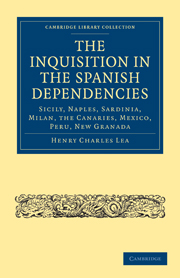 The Inquisition in the Spanish Dependencies
The Inquisition in the Spanish Dependencies Malta, if we may believe Salelles, enjoyed the honor of having St. Paul as the founder of its Inquisition, when he was cast ashore there on his voyage to Rome. In the sixteenth century, however, as a dependency of Sicily, it was under the Sicilian tribunal, which maintained an organization there, under a commissioner. When, in 1530, Charles V gave the island to the Knights of St. John, the Sicilian jurisdiction lapsed but, even without the Holy Office, the Church had efficient machinery for the suppression of heresy. In 1546 a Frenchman named Gesuald was found to have been for ten years infecting the islanders with Calvinist opinions, and the Aragonese Domingo Cubelles, the Bishop of Malta, was at no loss in exercising his episcopal jurisdiction. Gesuald was obstinate in his faith and was duly burnt alive; on his way to the stake he called out “Why do priests hesitate to take wives, since it is lawful?” whereupon Cubelles ordered him to be gagged and he perished in silence. His converts lacked his stubborn convictions and were reconciled—among them two priests who had secretly married their concubines, for which they were condemned to wear the sanbenito. In 1553, the Grand Master, Juan de Omedes, constituted three of the knights and a chaplain as an Inquisition, but there is no trace of their labors and Cubelles continued to exercise his episcopal jurisdiction in several cases during the following years.
To save this book to your Kindle, first ensure [email protected] is added to your Approved Personal Document E-mail List under your Personal Document Settings on the Manage Your Content and Devices page of your Amazon account. Then enter the ‘name’ part of your Kindle email address below. Find out more about saving to your Kindle.
Note you can select to save to either the @free.kindle.com or @kindle.com variations. ‘@free.kindle.com’ emails are free but can only be saved to your device when it is connected to wi-fi. ‘@kindle.com’ emails can be delivered even when you are not connected to wi-fi, but note that service fees apply.
Find out more about the Kindle Personal Document Service.
To save content items to your account, please confirm that you agree to abide by our usage policies. If this is the first time you use this feature, you will be asked to authorise Cambridge Core to connect with your account. Find out more about saving content to Dropbox.
To save content items to your account, please confirm that you agree to abide by our usage policies. If this is the first time you use this feature, you will be asked to authorise Cambridge Core to connect with your account. Find out more about saving content to Google Drive.